7 Days of Self-Care for Heart Health

February is American Heart Month and a time for all of us – especially those who are living with cardiovascular disease – to assess our personal heart health and make adjustments to our lifestyle to keep it strong. Establishing a seven-day self-care routine can help reduce the risk of heart disease and stroke that affects 20.1 million adults in the United States.
Self-care is multifaceted and incorporates a person’s physical, emotional and mental wellbeing to enhance overall health. Like any new routine, it will take some time to create the habit of adopting specific self-care activities into your daily life – so don’t be discouraged if you miss a day or two along the way.
If you’re unsure where to start, we have you covered. The following seven-day self-care plan can help get you on your way to a healthier heart. As always, be sure to check with your doctor before making any exercise or diet changes.
Spiritual Sunday
For many, Sundays are a day of rest and provide opportunities for worship, self-reflection and the time to focus on the beliefs and values that guide our daily lives. These activities can help us reduce stress and feel more relaxed. According to a 2017 heart failure study by the National Library of Medicine, a majority of the patients reported that spirituality and the power of inner faith allowed them to better cope with their diagnosis and maintain a positive outlook.
Mindful Monday
Practicing mindfulness promotes a compassionate and kind outlook, cultivates awareness and helps to keep us in the present moment. Taking a walk in nature and fully soaking in the beauty, journaling your thoughts and feelings of the day, remaining curious about your surroundings and intentional listening when conversing with others are all ways to stay mindful. The American Heart Association (AHA) states that the practice of mindfulness is linked to better sleep and stress management, and it may help you control high blood pressure and possibly lower your risk of heart disease.
Related: Ways to Love Your Heart: Health Tips for Seniors
Tasty Tuesday
Eating healthy does not mean sacrificing great flavors – a heart-healthy meal plan not only reduces your risk of developing coronary heart disease, it can help you maintain or lose weight, lower your risk of diabetes, help control cholesterol levels and has been known to be effective against some cancers. Not sure where to start? The AHA regularly publishes healthy recipes with how-to-prepare videos and has a heart-check certified food list to keep handy when grocery shopping!
Wellness Wednesday
Many heart conditions like high cholesterol, angina cardiomyopathy and pericarditis can go undetected if regular wellness visits and health screenings aren’t maintained. Most physicians recommend a routine physical at least once per year after ago 50, but if there is a history of heart disease or any chronic condition in your family, it is best to speak with your primary care physician to establish a wellness visit plan that works best for you. Along with regular screenings, your doctor can provide education on risk factors and symptoms of stroke, heart attack and other cardiovascular events.
Related: American Heart Month: Top Questions to Ask About Your Heart Health
Thoughtful Thursday
Did you know that there is a direct link between volunteering and heart health? Data collected from Harvard T.H. Chan School of Public Health’s Health and Retirement Study that included nearly 13,000 participants aged 50 and over suggested that volunteering is associated with better physical and mental health outcomes. The participants were more likely to maintain regular wellness visits compared to those who didn’t volunteer. Plus – giving back just makes you feel good and helps to reduce stress!
Fitness Friday
Staying fit and active is an excellent way to keep your heart healthy. Regular exercise strengthens the heart muscle and aides combatting artery damage from high cholesterol and blood pressure. For adults over the age of 65, the CDC recommends 150 minutes of moderate intensity activity per week such as brisk walking. Running, swimming, cycling and playing tennis also provide great aerobic exercise that can help boost your heart health, if your medical professional is comfortable with you doing so.
Related: Exercise for Health Aging
Social Saturday
Studies suggest that socialization keeps your heart healthy as you age. Meaningful relationships with family and friends with regular contact is just as important as eating healthy and physical activity. Take some time on the weekend to connect with old and new friends with a visit, phone call, email or good old-fashioned letter – their heart will be as happy as yours for the check-in!
At Concordia, our hope is that everyone achieves their wellness goals. Our home health service lines offer exceptional disease management for patients living with congestive heart failure, and our retirement living communities can give seniors the tools to better care for their heart health. If you would like more information about our services offered in Western Pennsylvania, Eastern Ohio or Tampa, Florida, call our administrative headquarters at 724-352-1571 or send us a message online.
Founded in 1881, Concordia Lutheran Ministries is a faith-based, CARF-CCAC-accredited Aging Services Network and recipient of the inaugural Pennsylvania Department of Aging Excellence in Quality Care Award. As one of the largest nonprofit senior care providers in the country, the organization serves 50,000 people annually through in-home care and inpatient locations in western PA, eastern OH and Tampa, FL.
Get Updates From Concordia
There is always a LOT happening at Concordia! Would you like to stay up-to-date with our news and events? Sign up for our monthly e-newsletter here.